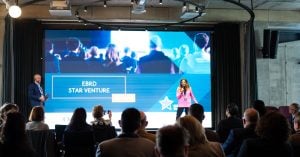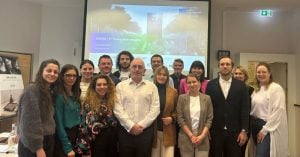• MClimate will further develop its IoT platform for smart home and building management, with support from The European Bank for Reconstruction and Development’s (EBRD) Green Innovation Programme.
• The money will be used to enrich the platform with a digital twin of the building and the ability for end users to download data and export reports.
• The Green Innovation Programme is focused in the CEE region, and has support from the EU and the TaiwanBusiness-EBRD Technical Cooperation Fund. It aims to assist R&D and deployment of green products, technologies or business models with beneficial impacts in terms of climate change mitigation, resilience to climate impact, pollution control, or the circular economy.
The project’s funding totals €65K, out of which EBRD and its partners are providing 90%, while MClimate is contributing the rest, Lyubomir Yanchev, Executive Director at MClimate tells The Recursive.
“EBRD is providing a grant for technical assistance under the GIP, which will help us fund the further development of our IoT SaaS platform MClimate Enterprise for smart buildings, by including key features such as digital twin and multiple buildings management. This will advance the platform further to offer smooth integration, consumption data patterns analysis, and energy savings collection for ESG reporting,” Lyubomir Yanchev further shares.
A solution for smart buildings
Every building can be a smart one, MClimate believes. The Bulgarian-founded IoT company designs and builds smart home and building automation devices, with a focus on sustainability. This is an encouraging view considering that households are a substantial generator of carbon dioxide emissions, ranging from heating and electricity, to water use and waste generation, and that buildings contribute approximately 40% of the energy consumption and 36% of the CO2 emissions in the EU.
The company aims to make it easy for all stakeholders to take responsibility for their impact and make better decisions. The result is a portfolio that includes affordable and universally compatible home and building automation products and services that can help property owners, facility managers, utilities and corporations improve their carbon footprint and monitor air quality and water leaks.
Specifically, the MClimate Enterprise is a web platform that enables the visualization and management of IoT devices, which provides actionable insights on improving the energy performance of the building. It does so through remote control of sensors, historical data collection and management, the generations of reports, and predictive maintenance.
Improving the platform
The new investment will be directed to developing a new version of the platform, more adapted to current market trends.
It will add a digital-twin of the building, with key features such as remote management of multiple buildings, floors, apartments, among others, as well as give access rights to tenants, owners, and managers to specific assets and functionalities. The new version will also include features that make it possible for end users to generate reports and data sheets, and download them.
“The EU has the ambitious goal to achieve carbon neutrality by 2050, and many corporations have set individual targets for 2030. In the meantime, buildings are responsible for approximately 40% of energy consumption and 36% of CO2 emissions in the EU and the majority do not have a Building Management System in place or have an obsolete one with no way for one system to “talk” to another system and exchange information. One cannot optimize what they cannot measure, so the winning combination is having both hardware to provide reliable and actionable data points and software to track, optimize and control remotely,” Lyubomir Yanchev explains.
The existing sensors and actuators (Ed.note devices that produce a motion by converting energy and signals going into the system) portfolio and the new IoT platform help automate, schedule, and monitor multiple devices, rooms, and buildings remotely. In this way, MClimate addresses energy inefficiencies and reduces the consumption and carbon footprint of buildings.
“This is the essence of the digital twin – it is not just a digital replica of physical assets, but rather is a complex model of how people and processes interact with their environment,” Lyubomir explains.
Through a digital twin, one can benefit from:
- Actionable data collection, download in reporting form and analysis for increasing operational efficiency and savings;
- Context of preferences for individual usage and patterns during the day with insights on interaction;
- And bidirectional changes of conditions, control of settings, and predictive/ proactive maintenance.
Collaboration with EBRD
Lyubomir goes on to add that this first grant is an important milestone for MClimate. However, going further, they are hoping for a longer-term cooperation with EBRD, given that innovation and green challenges have increasingly changed the focus of banks. Aside from having structured multiple debt and equity tools to help innovation growth, EBRD also has invaluable access to cities, municipalities, and private clients, which are currently focused on decarbonization.
“We believe banks play a major role in fighting the climate change by creating instruments that facilitate the deployment of ESG projects and influence the lending landscape for many corporates based on their carbon footprint and will continue our dialogue following the IoT SaaS development as energy efficiency as a service is slowly entering the banking world as a new service for existing customers and a sustainability feature for the bank itself,” Lyubomir Yanchev concludes.








